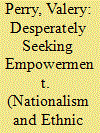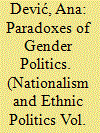|
|
|
Sort Order |
|
|
|
Items / Page
|
|
|
|
|
|
|
| Srl | Item |
| 1 |
ID:
179900


|
|
|
|
|
| Summary/Abstract |
How do leaders of indigenous minorities perceive political events among their trans-state national group? What motivates their attitudes toward these events? This article, drawing on a survey and elite interviews, examines the attitudes of Palestinian leaders in Israel, as a case study of an indigenous minority, toward the events (the Arab Spring) in their trans-state national group. The findings suggest that attitudes of Palestinian leaders in Israel toward the Arab Spring are determined by three main factors: their national or religious collective identity rather than their civic identity (national level), their values (international level), and the backdrop of the Arab-Israeli conflict (local level). The implications are as follows: an absence of change in Palestinians’ traditional alienation toward Israel; membership in the Arab world has somewhat replaced the framework of the Israeli-Palestinian conflict as a basis for positions toward regional issues; Palestinian leaders in Israel are divided regarding their values, fears and hopes for change; and that the interaction between the Israeli and international sphere determines their attitudes as an indigenous people. The intermixing of these elements shows the flexible (sometimes secondary) role of collective identity and the rise in democratic values rather than traditional issues.
|
|
|
|
|
|
|
|
|
|
|
|
|
|
|
|
| 2 |
ID:
179904


|
|
|
|
|
| Summary/Abstract |
The subject of this research is the attitudes of Roma women on the topic of violent extremism and radicalization in Serbia. It is at times perceived that the Roma population, characterized by an extremely low socio-economic status, is a highly vulnerable group, and thus often victim to manipulation by religious extremists. Within this group, Roma women are doubly discriminated and disadvantaged—as minority group members, and as women, due to the patriarchal concept of the Roma community and its rigid hierarchical organization. With some exceptions Roma women are typically subordinated to their male family members. This research is based on in-depth interviews and focus group discussions during which the author spoke with male and female members of the Roma community. As the only such study to date, the preliminary conclusions suggest that Roma women can, particularly under the influence of their male family members, become followers of fundamentalist or even radical religious interpretations, but that as they have a very significant role in the upbringing of children, they also have the potential to act, early and preventively, in order to suppress extremist ideologies. Moreover, educated Roma women working in government institutions and the civil sector may have the most significant role in the prevention of violent extremism and radicalization, especially those involved in awareness-raising among the marginalized women of the Roma community.
|
|
|
|
|
|
|
|
|
|
|
|
|
|
|
|
| 3 |
ID:
179901


|
|
|
|
|
| Summary/Abstract |
This article introduces this special section on the topic of gender and extremism/violent extremism in the Western Balkans. The author argues that this topic is best understood as a social phenomenon and an example of political violence. She briefly introduces some relevant concepts before summarizing the four articles in the collection, and then notes common over-arching themes.
|
|
|
|
|
|
|
|
|
|
|
|
|
|
|
|
| 4 |
ID:
179899


|
|
|
|
|
| Summary/Abstract |
Drawing from James C. Scott’s treatise, Seeing Like a State, this article examines the concept of “legibility” and argues that a population census with ethnic cleavages is a political maneuver for the state to control its subjects. Under British colonial rule, “legibility” was easily attained as the censuses provided the authorities with a simplified view of the society which allowed observation, control, and manipulation (in non-derogatory terms). However, in the post-independence context of Mauritius, for electoral purposes, there is no attempt to make the society officially “legible” through an updated population census with ethnic categories. By choosing to no longer classify its population on ethnic criteria for the sake of national unity and while continuing to rely on the 1972 population census for electoral purposes, even though it is outdated, it is in the state’s advantage to ensure control of its subjects, where this control is spurred by the societal structure, the institutional design, the census politics, and the parties’ politics and interests.
|
|
|
|
|
|
|
|
|
|
|
|
|
|
|
|
| 5 |
ID:
179905


|
|
|
|
|
| Summary/Abstract |
The article maps the positioning of women in the right-wing nationalist politics in Serbia, as well as the place of gender (equality) in the programs of these right-wing and other political parties. The grand frame of all right-wing groupings in Serbia is three-fold: (1) the collapse of the Yugoslav state and socialist regime; (2) the ethnonationalist frames of extreme wartime violence, which conditioned the Serbian postsocialist “transition”; and (3) the repatriarchalization of society and politics that resulted from the first two processes. The positioning of women in the New Right in Serbia will be explained by the context of the following processes: (a) nationalism and related historical revisionism that justifies the wars of the 1990s and their lasting unsettled aftermath, including the frozen conflict in Bosnia-Herzegovina and the unresolved status of Kosovo; (b) the transformation of Serbia from rogue state in the 1990s to the Europe-and-globally-friendly state; and (c) the globalization of the New Right, where the prominence of token women in leadership positions confuses their individual mobility with the broader goals of women’s solidarity, anti-discrimination struggle, and feminism.
|
|
|
|
|
|
|
|
|
|
|
|
|
|
|
|
| 6 |
ID:
179902


|
|
|
|
|
| Summary/Abstract |
This article presents an original analysis of portrayals of women in Bosnia and Herzegovina (BiH) on websites with radical and extremist content. We analyze and discuss key online narratives about women and their societal roles from 100 sampled online articles published on ten websites that primarily propagate right-wing, nationalist and Salafist thinking. The article shows that while Salafist websites focus on didactic material about how women are expected to act (selectively using the Quran and hadiths), radical ethno-nationalist and right-wing articles directly accuse liberal-thinking women and feminists of immorality, perversity, and shameful behavior. While studied articles on Islamic websites confine women’s roles to family caretakers and to wives, selected ethno-nationalist articles present women in relation to their national belonging and war victimization. We conclude that the studied websites essentialize women’s societal functions, predominantly placing their roles and identities in the private sphere while linking womanhood to collective national and/or religious identity. Although the selected platforms represent different manifestations of extremisms, they share many similarities.
|
|
|
|
|
|
|
|
|
|
|
|
|
|
|
|
| 7 |
ID:
179898


|
|
|
|
|
| Summary/Abstract |
As the USSR fell apart and independent countries took its place, minorities across Eurasia found themselves stranded in nationalizing states. This article focuses on one of these “beached diasporas”: Georgia’s Armenians. Through a mixed-methods approach, consisting of interviews with activists and a sociolinguistic experiment administered to adolescents (N = 529), we uncover differences among Armenians in their reactions to Georgia’s nationalization policies. Armenians from the borderland of Javakheti mobilized in defence of the in-group but their co-ethnics from the capital of Tbilisi opted for acculturation. These intragroup differences demonstrate that members of the same ethnic group can react to the same nationalization policies along disparate lines, thus adding nuance to the literature on beached diasporas in the post-Soviet space.
|
|
|
|
|
|
|
|
|
|
|
|
|
|
|
|
| 8 |
ID:
179903


|
|
|
|
|
| Summary/Abstract |
4Chan remains a compelling yet insufficiently explored phenomenon of the modern Internet. Through the years, it has developed an infamy, especially concerning its /pol/ subboard, for being a belligerent and potentially extremist online community. The subboard has developed a user base composed predominantly of males who, almost completely anonymously, through a giant number of daily posts, discuss issues in some way connected to politics. This has resulted in one predominant discourse on women and their roles in the political world, one marked by description of a presumed all-encompassing and crippling inferiority. This paper seeks to illuminate this discourse by performing discourse analysis on a database of posts made by Serbian /pol/ users. The analysis is described in three closely connected sections. The first focuses on the explicit framing of women in political roles. The second and third sections describe the discourse as it pertains to the lack of fitness women allegedly show through impersonal social relations and as intimate partners, which together construct a basis and influential linkage as subboard users argue that they are unfit for politics as well.
|
|
|
|
|
|
|
|
|
|
|
|
|
|
|
|
|
|
|
|
|